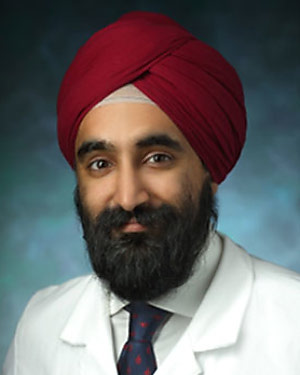Research Summary
Dr. Sabharwal's research focuses on identifying the factors driving intraocular pressure fluctuations and determining the role of fluctuations in glaucoma worsening. This work can help determine which subset of patients need more frequent visits or early interventions for glaucoma. Newer devices to continuously monitor eye pressure or to provide sustained release of eye drops have significant promis, but significant research needs to be done before they can be used in routine clinical practice.
Selected Publications
View all on PubMed
Sabharwal J*, Hou K, Herbert P, Bradley C, Johnson CA, Wall M, Ramulu PY, Unberath M, Yohannan J. A deep learning model incorporating spatial and temporal information successfully detects visual field worsening using a consensus based approach. Sci Rep. 2023 Jan 19;13(1):1041. doi: 10.1038/s41598-023-28003-6. PMID: 36658309;PMCID: PMC9852268.
Tao X, Sabharwal J, Wu SM, Frankfort BJ. Intraocular Pressure Elevation Compromises Retinal Ganglion Cell Light Adaptation. Invest Ophthalmol Vis Sci. 2020 Oct 1;61(12):15. doi: 10.1167/iovs.61.12.15. PMID: 33064129; PMCID:PMC7571289.
Tao X, Sabharwal J, Seilheimer RL, Wu SM, Frankfort BJ. Mild Intraocular Pressure Elevation in Mice Reveals Distinct Retinal Ganglion Cell Functional Thresholds and Pressure-Dependent Properties. J Neurosci. 2019 Jan 8. pii:2085-18.
Sabharwal J, Seilheimer RL, Tao X, Cowan CS, Frankfort BJ, Wu SM. Elevated IOP alters the space-time profiles in the center and surround of both ON and OFF RGCs in mouse. Proc Natl Acad Sci USA. 2017; 114(33):8859-64
Cowan CS, Sabharwal J*, Seilheimer RL, Wu SM. Distinct subcomponents of mouse retinal ganglion cell receptive fields are differentially altered by light adaptation. Vision Res. 2017;131:96-105.
Sabharwal J, Seilheimer RL, Cowan CS, Wu SM. The ON Crossover Circuitry Shapes Spatiotemporal Profile in the Center and Surround of Mouse OFF Retinal Ganglion Cells. Front Neural Circuits. 2016;10:106.
Cowan CS, Sabharwal J*, Wu SM. Space-time codependence of retinal ganglion cells can be explained by novel and separable components of their receptive fields. Physiol Rep. 2016;4(17)


Patient Ratings & Comments
The Patient Rating score is an average of all responses to physician related questions on the national CG-CAHPS Medical Practice patient experience survey through Press Ganey. Responses are measured on a scale of 1 to 5, with 5 being the best score. Comments are also gathered from our CG-CAHPS Medical Practice Survey through Press Ganey and displayed in their entirety. Patients are de-identified for confidentiality and patient privacy.